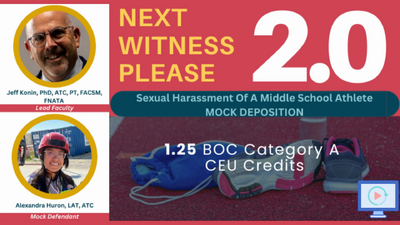Course Info (BOC Domains of Athletic Training; Presentation Description; Learning Objectives; Clinical Practice Gap Statement; Clinical Bottom Line; Summary Conclusions)
BOC Domains of Athletic Training:
- Domain IV - Healthcare Administration and Professional Responsibility
Presentation Description:
This webinar engages participants in a mock deposition centered around a sexual harassment lawsuit in the context of sports medicine. Attendees will delve into a simulated case where a middle school athlete alleges misconduct against a BOC Certified Athletic Trainer. Through this scenario, we will explore the complexities of legal procedures, the ramifications of accusations within the sports medicine community, and the intricacies of maintaining professional boundaries and ethics in the practice.
Learning Objectives:
- Understand the legal process involved in a deposition through a mock sexual harassment lawsuit scenario.
- Examine the roles and responsibilities of a BOC Certified Athletic Trainer in maintaining professional ethics and boundaries.
- Assess the adequacy of current training and oversight procedures in protecting student-athletes.
- Evaluate the implications of a lawsuit on the personal and professional life of a sports medicine professional.
Clinical Practice Gap Statement:
Despite stringent policies and training, the prevention of harassment within sports medicine remains a significant challenge. This mock deposition uncovers the clinical practice gaps in recognizing and enforcing professional boundaries and the potential disconnect between policy and practice. Athletic Trainers must frequently navigate complex interpersonal dynamics, where the nuances of interactions can be misinterpreted. This session will dissect a real-world scenario, highlighting the necessity for improved strategies that ensure student-athlete safety and professional integrity within the healthcare delivery model.
Clinical Bottom Line Statement:
The mock deposition underscores the need for robust and ongoing training for Athletic Trainers in recognizing and mitigating harassment. It highlights the critical role of clear communication and reporting structures, as well as the enforcement of conduct policies to protect both the welfare of student-athletes and the reputations of healthcare providers. The case demonstrates the high stakes of legal and ethical compliance, reinforcing the Athletic Trainer's duty to uphold the highest standards of conduct in clinical practice.
Summary Conclusion Statement:
This webinar brings to light the pressing need for diligent adherence to professional conduct and the implementation of comprehensive educational programs to combat harassment in sports medicine. Participants will leave with a heightened awareness of the legal and ethical dimensions of their roles and the impact of their actions on the lives of the athletes they serve. The mock deposition serves as a potent reminder of the enduring imperative to foster a safe and respectful environment for all involved in sports medicine.


